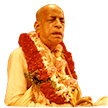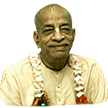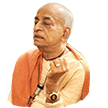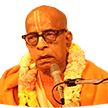Vedic Knowledge - an essential subject: Difference between revisions
(Created page with "Category:Essential Subjects <!----------------------- edit below this line -----------------------> <!------------------------ begin introduction text --------------------...") |
(Vanibot #0041: Moves Choose Another box to the end) |
||
| Line 2: | Line 2: | ||
<!----------------------- edit below this line -----------------------> | <!----------------------- edit below this line -----------------------> | ||
<!------------------------ begin introduction text ------------------------> | <!------------------------ begin introduction text ------------------------> | ||
Vedic knowledge is complete because it is above all doubts | Vedic knowledge is complete because it is above all doubts, all mistakes and is infallible. If however, one simply talks of Vedic knowledge, it becomes dry and speculative. Dry Vedic knowledge makes one impersonalist with only partial realization. Therefore bhakti must be there. Bhakti means without any result or karma and jñāna. When one talks of Kṛṣṇa and Kṛṣṇa's līlā, Kṛṣṇa's pastimes, then it becomes simultaneously discussion of Vedic knowledge and at the same time very beautiful. Therefore Kṛṣṇa is never described by ordinary verses. | ||
Srila Prabhupada's books, lectures, conversations and letters offer a comprehensive presentation of this essential subject as seen in the '''[[Vaniquotes:Category:Vedic Knowledge| | Srila Prabhupada's books, lectures, conversations and letters offer a comprehensive presentation of this essential subject as seen in the Vaniquotes '''[[Vaniquotes:Category:Vedic Knowledge|Vedic Knowledge]]''' category. An introduction from his books is given below in the following 16 quotes. | ||
<!-------- end introduction text and don't touch next three lines ---------> | <!-------- end introduction text and don't touch next three lines ---------> | ||
---- | ---- | ||
== Quotes from Srila Prabhupada's books == | == Quotes from Srila Prabhupada's books == | ||
<!----------------- edit quote boxes below this line -----------------> | <!----------------- edit quote boxes below this line -----------------> | ||
{{VaniQuotebox|The essence of all Vedic knowledge is included in the eight syllables Hare Krsna, Hare Krsna|The essence of all Vedic knowledge—comprehending the three kinds of Vedic activity (karma-kāṇḍa, jñāna-kāṇḍa and upāsanā-kāṇḍa), the chandas, or Vedic hymns, and the processes for satisfying the demigods—is included in the eight syllables Hare Kṛṣṇa, Hare Kṛṣṇa. This is the reality of all Vedānta. The chanting of the holy name is the only means to cross the ocean of nescience. '''( Caitanya-caritāmṛta, Ādi-līlā 7.76)'''}} | {{VaniQuotebox|The essence of all Vedic knowledge is included in the eight syllables Hare Krsna, Hare Krsna|The essence of all Vedic knowledge—comprehending the three kinds of Vedic activity (karma-kāṇḍa, jñāna-kāṇḍa and upāsanā-kāṇḍa), the chandas, or Vedic hymns, and the processes for satisfying the demigods—is included in the eight syllables Hare Kṛṣṇa, Hare Kṛṣṇa. This is the reality of all Vedānta. The chanting of the holy name is the only means to cross the ocean of nescience. '''(Caitanya-caritāmṛta, Ādi-līlā 7.76)'''}} | ||
{{VaniQuotebox|The Lord is the destroyer of all material contamination because His form is personified Vedic knowledge. All the Vedas worship the transcendental form of the Lord|The form of the Lord in any shape is always transcendental and full of knowledge and mercy. The Lord is the destroyer of all material contamination because His form is personified Vedic knowledge. All the Vedas worship the transcendental form of the Lord. '''( | {{VaniQuotebox|The Lord is the destroyer of all material contamination because His form is personified Vedic knowledge. All the Vedas worship the transcendental form of the Lord|The form of the Lord in any shape is always transcendental and full of knowledge and mercy. The Lord is the destroyer of all material contamination because His form is personified Vedic knowledge. All the Vedas worship the transcendental form of the Lord. '''(Śrīmad-Bhāgavatam 3.13.26)'''}} | ||
{{VaniQuotebox|A person with mundane senses cannot fully understand the name, qualities, form and pastimes of Sri Krsna. The Puranas are therefore meant to explain and supplement Vedic knowledge|Person with mundane senses cannot fully understand the name, qualities, form and pastimes of Śrī Kṛṣṇa. The Purāṇas are therefore meant to explain and supplement Vedic knowledge. The great sages present the Purāṇas in order to make the Vedic mantras understandable for common men. '''( Caitanya-caritāmṛta, Madhya-līlā 6.147)'''}} | {{VaniQuotebox|A person with mundane senses cannot fully understand the name, qualities, form and pastimes of Sri Krsna. The Puranas are therefore meant to explain and supplement Vedic knowledge|Person with mundane senses cannot fully understand the name, qualities, form and pastimes of Śrī Kṛṣṇa. The Purāṇas are therefore meant to explain and supplement Vedic knowledge. The great sages present the Purāṇas in order to make the Vedic mantras understandable for common men. '''(Caitanya-caritāmṛta, Madhya-līlā 6.147)'''}} | ||
{{VaniQuotebox|According to learned scholars, there are three different sources of knowledge, which are called prasthana-traya. According to these scholars, Vedanta is one of such sources, for it presents Vedic knowledge on the basis of logic and sound arguments|According to learned scholars, there are three different sources of knowledge, which are called prasthāna-traya. According to these scholars, Vedānta is one of such sources, for it presents Vedic knowledge on the basis of logic and sound arguments. In the Bhagavad-gītā (13.5) the Lord says, brahma-sūtra-padaiś caiva hetumadbhir viniścitaiḥ: "Understanding of the ultimate goal of life is ascertained in the Brahma-sūtra by legitimate logic and argument concerning cause and effect." '''( Caitanya-caritāmṛta, Ādi-līlā 7.106)'''}} | {{VaniQuotebox|According to learned scholars, there are three different sources of knowledge, which are called prasthana-traya. According to these scholars, Vedanta is one of such sources, for it presents Vedic knowledge on the basis of logic and sound arguments|According to learned scholars, there are three different sources of knowledge, which are called prasthāna-traya. According to these scholars, Vedānta is one of such sources, for it presents Vedic knowledge on the basis of logic and sound arguments. In the Bhagavad-gītā (13.5) the Lord says, brahma-sūtra-padaiś caiva hetumadbhir viniścitaiḥ: "Understanding of the ultimate goal of life is ascertained in the Brahma-sūtra by legitimate logic and argument concerning cause and effect." '''(Caitanya-caritāmṛta, Ādi-līlā 7.106)'''}} | ||
{{VaniQuotebox|The perfect knowledge of the Vedas is to know the Lord, the Personality of Godhead, and that is the end of Vedic knowledge, or Vedanta|A real brāhmaṇa is the natural teacher or spiritual master. Unless one has Vedic knowledge, one cannot become a spiritual master. The perfect knowledge of the Vedas is to know the Lord, the Personality of Godhead, and that is the end of Vedic knowledge, or Vedānta. '''( Śrīmad-Bhāgavatam 3.6.30)'''}} | {{VaniQuotebox|The perfect knowledge of the Vedas is to know the Lord, the Personality of Godhead, and that is the end of Vedic knowledge, or Vedanta|A real brāhmaṇa is the natural teacher or spiritual master. Unless one has Vedic knowledge, one cannot become a spiritual master. The perfect knowledge of the Vedas is to know the Lord, the Personality of Godhead, and that is the end of Vedic knowledge, or Vedānta. '''(Śrīmad-Bhāgavatam 3.6.30)'''}} | ||
{{VaniQuotebox|The scriptures of the yavanas are three: the Old Testament, the New Testament and the Koran. Their compilation has a history; they are not eternal like the Vedic knowledge|The śāstras of the yavanas, or meat-eaters, are not eternal scriptures. They have been fashioned recently, and sometimes they contradict one another. The scriptures of the yavanas are three: the Old Testament, the New Testament and the Koran. Their compilation has a history; they are not eternal like the Vedic knowledge. Therefore although they have their arguments and reasonings, they are not very sound and transcendental. '''( Caitanya-caritāmṛta, Ādi-līlā 17.169)'''}} | {{VaniQuotebox|The scriptures of the yavanas are three: the Old Testament, the New Testament and the Koran. Their compilation has a history; they are not eternal like the Vedic knowledge|The śāstras of the yavanas, or meat-eaters, are not eternal scriptures. They have been fashioned recently, and sometimes they contradict one another. The scriptures of the yavanas are three: the Old Testament, the New Testament and the Koran. Their compilation has a history; they are not eternal like the Vedic knowledge. Therefore although they have their arguments and reasonings, they are not very sound and transcendental. '''(Caitanya-caritāmṛta, Ādi-līlā 17.169)'''}} | ||
{{VaniQuotebox|For learning Vedic knowledge, one must approach a person who is cent percent engaged in devotional service. He must not do things which are forbidden in the sastras. A person cannot be a teacher if he drinks or smokes|For learning Vedic knowledge, one must approach a person who is cent percent engaged in devotional service. He must not do things which are forbidden in the śāstras. A person cannot be a teacher if he drinks or smokes. In the modern system of education the teacher's academic qualification is taken into consideration without evaluation of his moral life. Therefore, the result of education is misuse of high intelligence in so many ways. '''( Śrīmad-Bhāgavatam 1.9.26)'''}} | {{VaniQuotebox|For learning Vedic knowledge, one must approach a person who is cent percent engaged in devotional service. He must not do things which are forbidden in the sastras. A person cannot be a teacher if he drinks or smokes|For learning Vedic knowledge, one must approach a person who is cent percent engaged in devotional service. He must not do things which are forbidden in the śāstras. A person cannot be a teacher if he drinks or smokes. In the modern system of education the teacher's academic qualification is taken into consideration without evaluation of his moral life. Therefore, the result of education is misuse of high intelligence in so many ways. '''(Śrīmad-Bhāgavatam 1.9.26)'''}} | ||
{{VaniQuotebox|By culture of Vedic knowledge one must know Lord Krsna and should not falsely speculate on the word aham, or "I." The only method for understanding the Supreme Truth is devotional service|By culture of Vedic knowledge one must know Lord Kṛṣṇa and should not falsely speculate on the word aham, or "I." The only method for understanding the Supreme Truth is devotional service, as stated in Bhagavad-gītā (18.55): bhaktyā mām abhijānāti yāvān yaś cāsmi tattvataḥ. Only by devotional service can one know that the ultimate truth is the Personality of Godhead. '''( Śrīmad-Bhāgavatam 3.6.40)'''}} | {{VaniQuotebox|By culture of Vedic knowledge one must know Lord Krsna and should not falsely speculate on the word aham, or "I." The only method for understanding the Supreme Truth is devotional service|By culture of Vedic knowledge one must know Lord Kṛṣṇa and should not falsely speculate on the word aham, or "I." The only method for understanding the Supreme Truth is devotional service, as stated in Bhagavad-gītā (18.55): bhaktyā mām abhijānāti yāvān yaś cāsmi tattvataḥ. Only by devotional service can one know that the ultimate truth is the Personality of Godhead. '''(Śrīmad-Bhāgavatam 3.6.40)'''}} | ||
{{VaniQuotebox|Because human society is poverty-stricken and men are devoid of Vedic knowledge and the power to chant the Vedic mantras, the Hare Krsna maha-mantra is the only shelter. People should be intelligent enough to chant it|Because human society is poverty-stricken and men are devoid of Vedic knowledge and the power to chant the Vedic mantras, the Hare Kṛṣṇa mahā-mantra is the only shelter. People should be intelligent enough to chant it. Yajñaiḥ saṅkīrtana-prāyair yajanti hi sumedhasaḥ ( Śrīmad-Bhāgavatam 11.5.32). Those whose brains are dull cannot understand this chanting, nor can they take to it. '''( Śrīmad-Bhāgavatam 9.1.17)'''}} | {{VaniQuotebox|Because human society is poverty-stricken and men are devoid of Vedic knowledge and the power to chant the Vedic mantras, the Hare Krsna maha-mantra is the only shelter. People should be intelligent enough to chant it|Because human society is poverty-stricken and men are devoid of Vedic knowledge and the power to chant the Vedic mantras, the Hare Kṛṣṇa mahā-mantra is the only shelter. People should be intelligent enough to chant it. Yajñaiḥ saṅkīrtana-prāyair yajanti hi sumedhasaḥ (Śrīmad-Bhāgavatam 11.5.32). Those whose brains are dull cannot understand this chanting, nor can they take to it. '''( Śrīmad-Bhāgavatam 9.1.17)'''}} | ||
{{VaniQuotebox|Austerity in the form of meditation is My (the Supreme Personality of Godhead) heart, Vedic knowledge in the form of hymns and mantras constitutes My body, and spiritual activities and ecstatic emotions are My actual form|My dear brāhmaṇa, austerity in the form of meditation is My heart, Vedic knowledge in the form of hymns and mantras constitutes My body, and spiritual activities and ecstatic emotions are My actual form. The ritualistic ceremonies and sacrifices, when properly conducted, are the various limbs of My body, the unseen good fortune proceeding from pious or spiritual activities constitutes My mind, and the demigods who execute My orders in various departments are My life and soul. '''( Śrīmad-Bhāgavatam 6.4.46)'''}} | {{VaniQuotebox|Austerity in the form of meditation is My (the Supreme Personality of Godhead) heart, Vedic knowledge in the form of hymns and mantras constitutes My body, and spiritual activities and ecstatic emotions are My actual form|My dear brāhmaṇa, austerity in the form of meditation is My heart, Vedic knowledge in the form of hymns and mantras constitutes My body, and spiritual activities and ecstatic emotions are My actual form. The ritualistic ceremonies and sacrifices, when properly conducted, are the various limbs of My body, the unseen good fortune proceeding from pious or spiritual activities constitutes My mind, and the demigods who execute My orders in various departments are My life and soul. '''(Śrīmad-Bhāgavatam 6.4.46)'''}} | ||
{{VaniQuotebox|All material and mundane information is tainted by illusion, error, cheating and imperfection of the senses. Because Vedic knowledge was imparted by the Supreme Lord, who is transcendental to material creation, it is perfect|Vedic knowledge is understood to be spoken by the Supreme Lord, and therefore it is free from the defects of material understanding. Material understanding is defective. If we hear something from a conditioned soul, it is full of defects. All material and mundane information is tainted by illusion, error, cheating and imperfection of the senses. Because Vedic knowledge was imparted by the Supreme Lord, who is transcendental to material creation, it is perfect. If we receive that Vedic knowledge from Brahmā in disciplic succession, then we receive perfect knowledge. '''( Śrīmad-Bhāgavatam 3.26.33)'''}} | {{VaniQuotebox|All material and mundane information is tainted by illusion, error, cheating and imperfection of the senses. Because Vedic knowledge was imparted by the Supreme Lord, who is transcendental to material creation, it is perfect|Vedic knowledge is understood to be spoken by the Supreme Lord, and therefore it is free from the defects of material understanding. Material understanding is defective. If we hear something from a conditioned soul, it is full of defects. All material and mundane information is tainted by illusion, error, cheating and imperfection of the senses. Because Vedic knowledge was imparted by the Supreme Lord, who is transcendental to material creation, it is perfect. If we receive that Vedic knowledge from Brahmā in disciplic succession, then we receive perfect knowledge. '''(Śrīmad-Bhāgavatam 3.26.33)'''}} | ||
{{VaniQuotebox|A devotee of Sri Caitanya Mahaprabhu must engage in preaching in order to increase the followers of the Lord. By thus preaching actual Vedic knowledge all over the world, one will benefit all mankind|Everyone should engage in preaching, following in the footsteps of Śrī Caitanya Mahāprabhu. In this way one will be very much appreciated by Lord Kṛṣṇa and will quickly be recognized by Him. Actually a devotee of Śrī Caitanya Mahāprabhu must engage in preaching in order to increase the followers of the Lord. By thus preaching actual Vedic knowledge all over the world, one will benefit all mankind. '''( Caitanya-caritāmṛta, Madhya-līlā 7.152)'''}} | {{VaniQuotebox|A devotee of Sri Caitanya Mahaprabhu must engage in preaching in order to increase the followers of the Lord. By thus preaching actual Vedic knowledge all over the world, one will benefit all mankind|Everyone should engage in preaching, following in the footsteps of Śrī Caitanya Mahāprabhu. In this way one will be very much appreciated by Lord Kṛṣṇa and will quickly be recognized by Him. Actually a devotee of Śrī Caitanya Mahāprabhu must engage in preaching in order to increase the followers of the Lord. By thus preaching actual Vedic knowledge all over the world, one will benefit all mankind. '''(Caitanya-caritāmṛta, Madhya-līlā 7.152)'''}} | ||
{{VaniQuotebox|The duty of a brahmana is to become learned in the Vedic literature and teach the Vedic knowledge to other brahmanas. In our Krsna consciousness movement we are simply teaching our students to become fit brahmanas and Vaisnavas|The duty of a brāhmaṇa is to become learned in the Vedic literature and teach the Vedic knowledge to other brāhmaṇas. In our Kṛṣṇa consciousness movement we are simply teaching our students to become fit brāhmaṇas and Vaiṣṇavas. '''( Caitanya-caritāmṛta, Ādi-līlā 17.253)'''}} | {{VaniQuotebox|The duty of a brahmana is to become learned in the Vedic literature and teach the Vedic knowledge to other brahmanas. In our Krsna consciousness movement we are simply teaching our students to become fit brahmanas and Vaisnavas|The duty of a brāhmaṇa is to become learned in the Vedic literature and teach the Vedic knowledge to other brāhmaṇas. In our Kṛṣṇa consciousness movement we are simply teaching our students to become fit brāhmaṇas and Vaiṣṇavas. '''(Caitanya-caritāmṛta, Ādi-līlā 17.253)'''}} | ||
{{VaniQuotebox|The living entities are parts and parcels of Krsna; therefore, revival of Krsna consciousness by the individual living entity is the highest perfectional stage of Vedic knowledge|The relationship of the living entities with Kṛṣṇa is also mentioned in the Fifteenth Chapter of Bhagavad-gītā (15.7). The living entities are parts and parcels of Kṛṣṇa; therefore, revival of Kṛṣṇa consciousness by the individual living entity is the highest perfectional stage of Vedic knowledge. '''( Bhagavad-gītā 2.46)'''}} | {{VaniQuotebox|The living entities are parts and parcels of Krsna; therefore, revival of Krsna consciousness by the individual living entity is the highest perfectional stage of Vedic knowledge|The relationship of the living entities with Kṛṣṇa is also mentioned in the Fifteenth Chapter of Bhagavad-gītā (15.7). The living entities are parts and parcels of Kṛṣṇa; therefore, revival of Kṛṣṇa consciousness by the individual living entity is the highest perfectional stage of Vedic knowledge. '''(Bhagavad-gītā 2.46)'''}} | ||
{{VaniQuotebox|Whether one follows Vedic knowledge or modern science, one cannot deny the existence of the spirit soul in the body, and the science of the soul is explicitly described in the Bhagavad-gita by the Personality of Godhead Himself|In the sunshine there are innumerable radiant molecules. Similarly, the fragmental parts of the Supreme Lord are atomic sparks of the rays of the Supreme Lord, called by the name prabhā, or superior energy. So whether one follows Vedic knowledge or modern science, one cannot deny the existence of the spirit soul in the body, and the science of the soul is explicitly described in the Bhagavad-gītā by the Personality of Godhead Himself. '''( Bhagavad-gītā 2.17)'''}} | {{VaniQuotebox|Whether one follows Vedic knowledge or modern science, one cannot deny the existence of the spirit soul in the body, and the science of the soul is explicitly described in the Bhagavad-gita by the Personality of Godhead Himself|In the sunshine there are innumerable radiant molecules. Similarly, the fragmental parts of the Supreme Lord are atomic sparks of the rays of the Supreme Lord, called by the name prabhā, or superior energy. So whether one follows Vedic knowledge or modern science, one cannot deny the existence of the spirit soul in the body, and the science of the soul is explicitly described in the Bhagavad-gītā by the Personality of Godhead Himself. '''(Bhagavad-gītā 2.17)'''}} | ||
{{VaniQuotebox|When Vyasadeva was not satisfied even after compiling heaps of books of Vedic knowledge, Narada Muni, his spiritual master, explained that no path of self-realization can be successful unless it is mixed with devotional service|When Vyāsadeva was not satisfied even after compiling heaps of books of Vedic knowledge, Nārada Muni, his spiritual master, explained that no path of self-realization can be successful unless it is mixed with devotional service. When Nārada Muni arrived, Vyāsadeva was sitting by the banks of the river Sarasvatī in a state of depression. '''(Teachings of Lord Caitanya, Chapter 11)'''}} | {{VaniQuotebox|When Vyasadeva was not satisfied even after compiling heaps of books of Vedic knowledge, Narada Muni, his spiritual master, explained that no path of self-realization can be successful unless it is mixed with devotional service|When Vyāsadeva was not satisfied even after compiling heaps of books of Vedic knowledge, Nārada Muni, his spiritual master, explained that no path of self-realization can be successful unless it is mixed with devotional service. When Nārada Muni arrived, Vyāsadeva was sitting by the banks of the river Sarasvatī in a state of depression. '''(Teachings of Lord Caitanya, Chapter 11)'''}} | ||
| Line 47: | Line 47: | ||
'''Vedic Knowledge - [[Vaniquotes:Category:Vedic Knowledge|explore more within this category]]'''. | '''Vedic Knowledge - [[Vaniquotes:Category:Vedic Knowledge|explore more within this category]]'''. | ||
{{EsentialSubjectTotal}} | |||
<div style="float:left;"> | |||
{{EssentialSubjectnav}} | |||
</div> | |||
__NOTOC__ | __NOTOC__ | ||
__NOEDITSECTION__ | __NOEDITSECTION__ | ||
Latest revision as of 18:07, 22 November 2020
Vedic knowledge is complete because it is above all doubts, all mistakes and is infallible. If however, one simply talks of Vedic knowledge, it becomes dry and speculative. Dry Vedic knowledge makes one impersonalist with only partial realization. Therefore bhakti must be there. Bhakti means without any result or karma and jñāna. When one talks of Kṛṣṇa and Kṛṣṇa's līlā, Kṛṣṇa's pastimes, then it becomes simultaneously discussion of Vedic knowledge and at the same time very beautiful. Therefore Kṛṣṇa is never described by ordinary verses.
Srila Prabhupada's books, lectures, conversations and letters offer a comprehensive presentation of this essential subject as seen in the Vaniquotes Vedic Knowledge category. An introduction from his books is given below in the following 16 quotes.
Quotes from Srila Prabhupada's books
Vedic Knowledge - explore more within this category.
Vanipedia has now over 903 introductory articles compiled from Srila Prabhupada's books under the series titled Essential Subjects. All these articles can be seen in the Table of Content on the right side of this article and also here in this Umbrella Category. Browse through them to relish the breadth and depth of Srila Prabhupada's teachings - There is a subject for everyone.














